Beach Metal Detecting in the UK: A Beginner's Guide to the Rules

Written by Piotr Lesniewski
Detectorist • Scotland
As an Amazon Associate we earn commission from qualifying purchases. Read our full Affiliate Disclosure.
Beach metal detecting is an incredibly rewarding hobby, offering fresh air, gentle exercise, and the tantalizing possibility of unearthing lost coins, forgotten jewellery, or even a piece of history.
But before you grab your metal detector and rush to the nearest beach, you’re probably wondering about the rules.
It’s a common question for beginners, and a very important one!
Getting it right means you can relax and enjoy your treasure hunting adventures without any worries.
Many newcomers focus on getting the right equipment, which is important, but understanding the permissions and responsibilities is the real key to unlocking long-term enjoyment of this fascinating pastime.
Often, the main hurdle isn’t the metal detector itself, but navigating the web of regulations.
Key Takeaways
- Yes, you can metal detect on many UK beaches, especially Crown Estate foreshore
- No permit needed on Crown Estate foreshore (between high and low tide marks)
- The Crown Estate offers “permissive permission” for metal detecting there
- National Trust beaches ban all metal detecting except for archaeological projects
- Private beaches require landowner permission before metal detecting
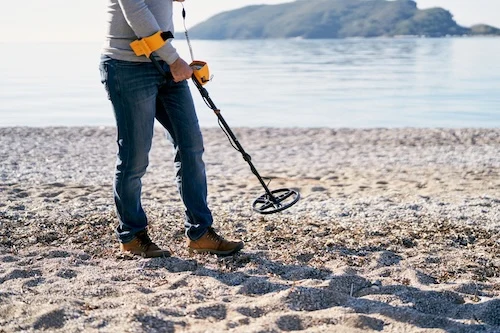
Do I Need Permission to Metal Detect on Public Beaches in the UK?
This is one of the first questions every new detectorist asks, and the answer is a classic “yes, no, maybe!“.
It all boils down to who actually owns or manages the specific stretch of sand you’re interested in. You see, “public beach” isn’t a one-size-fits-all legal term when it comes to metal detecting.
The reality is that a single beach area can have multiple layers of ownership or management, especially when you consider the foreshore (the area between high and low tide marks) compared to the land above the high tide line or adjacent areas.
This complexity means that what you assume to be a “public” beach can have different rules for different zones.
A significant portion of the UK’s foreshore in England, Wales, and Northern Ireland is owned by The Crown Estate.
The good news is that, generally, you can metal detect on their foreshore without needing a specific permit, as long as you adhere to their conditions.
These usually involve surface searching only (no deep digging) and using only hand tools.
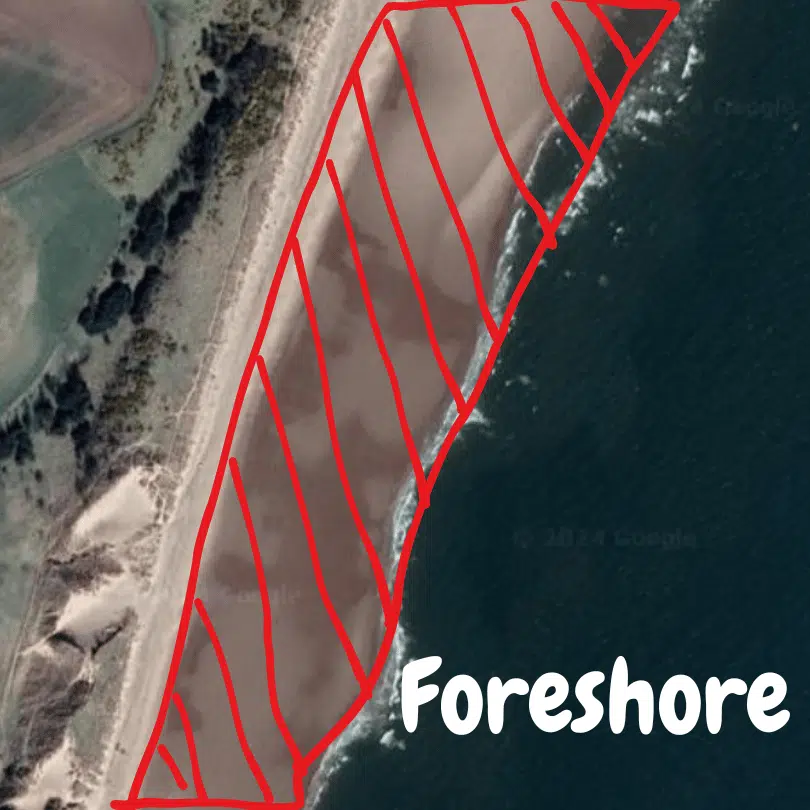
In Scotland, beaches managed by Crown Estate Scotland also operate under a generally implied right of access for detecting on their foreshore, meaning prior permission isn’t typically required for these areas either.
However, many beaches, or parts of them, are managed by local councils. For these, you absolutely must check their specific metal detecting laws and local council policies on metal detecting, as rules can vary from one council to another.
For instance, East Devon Council allows individuals to metal detect at any time but requires appropriate public liability insurance and permission for any organised group meets.
Then there are privately-owned beaches.
If a beach is in private hands, you must obtain explicit permission from the landowner before you even think about switching on your detector.
Detecting on private land without such permission is trespassing and illegal.
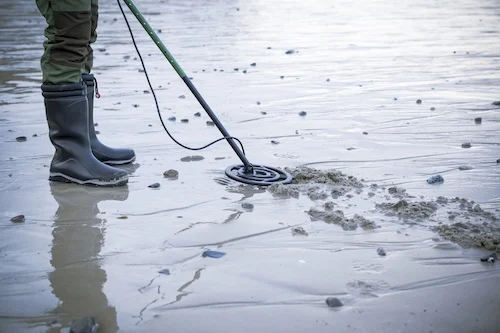
So, how do you find out who owns the beach?
For Crown Estate land, they provide online maps that show the foreshore they manage.
For council-owned beaches, your first port of call should be the local council’s website. Many have dedicated pages for metal detecting or list their byelaws online.
For privately-owned land in England and Wales, HM Land Registry can sometimes help identify landowners, though this may involve a fee. In Scotland, Scotland’s Land Information Service (ScotLIS) might be a starting point.
It’s crucial to do this research before you go. Failing to understand these ownership nuances and assuming all of a “public beach” is open for detecting is a common way beginners can inadvertently find themselves breaking rules or trespassing, which can harm the reputation of the hobby for everyone.
Use The Crown Estates Interactive Map To Check If You Can Metal Detect On A Local Beach
Seriously, one of the best tools in a beach detectorist’s kit is the Crown Estate’s interactive online map.
It takes all the guesswork out of figuring out where those Crown Estate beaches are – the ones where we can often detect without jumping through hoops for permission.
This an incredibly useful resource for metal detectorists! The areas the Crown Estate owns are clearly marked in purple.
You can even search for your favorite beaches to see if they’re included.
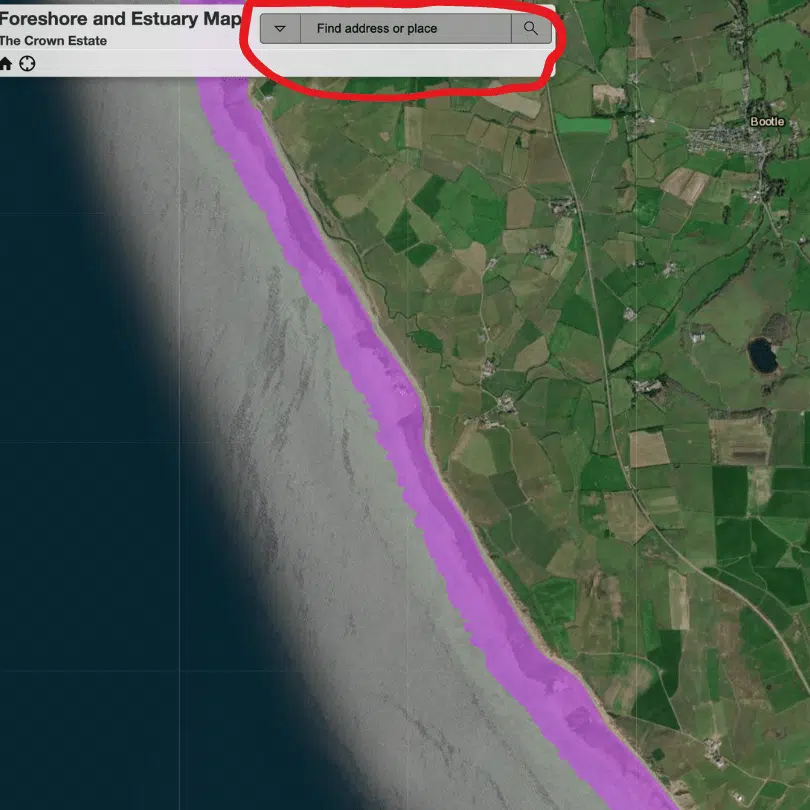
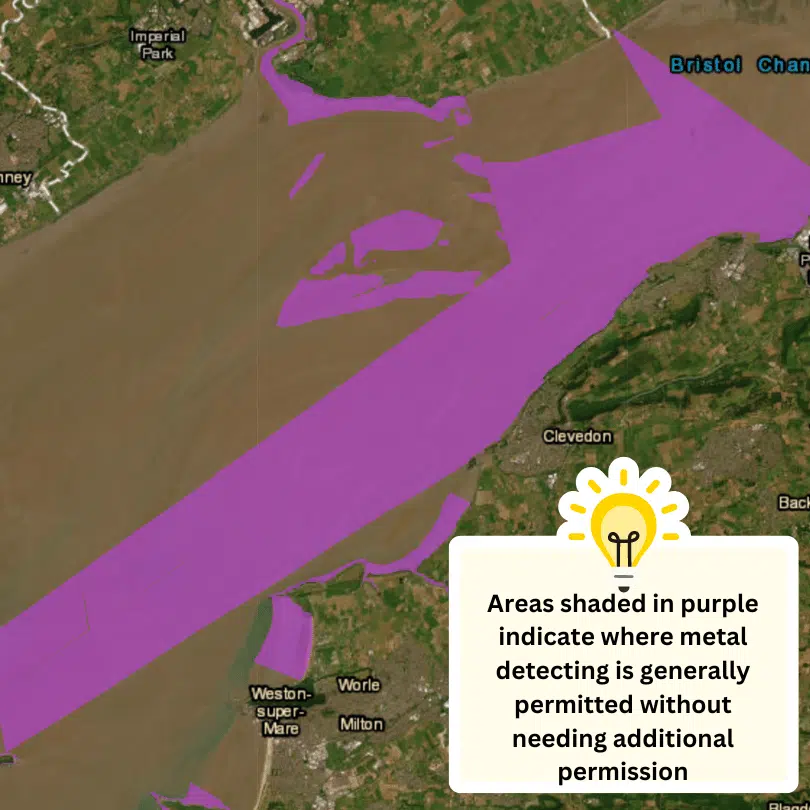
Beyond the Crown Estate: The ‘Know Before You Go‘ Zone
It’s important to remember that areas not shaded in purple are either privately owned or belong to other entities like local councils.
Unfortunately, the maps don’t show ownership of beaches above the high tide line, where you’ll often encounter private landowners or local authorities with their own rules.
Limitations
The maps only show Crown Estate ownership, not public access rights or restrictions on activities like metal detecting.
Even for Crown Estate lands, you may still need separate permission from them or the leaseholder for certain activities.
Using the Crown Estate’s online maps is the best way to visually check if a specific beach’s foreshore or estuary is owned by them, indicated by the purple shading.
But you may need to inquire further about access permissions.
If the Crown Estate does not own a beach, you must always get permission from the landowner.

Are There Any Beaches Where Metal Detecting is Completely Banned?
It’s crucial you know that not every stretch of coastline is open for detecting, even if it looks inviting.
Some beaches have strict protections in place, primarily to safeguard our natural heritage and archaeological treasures.
Understanding why these bans exist can help you appreciate their importance; it’s not just about rules for rules’ sake, but about conserving fragile ecosystems and undisturbed historical contexts for future generations.
National Trust Beaches Are Off Limit’s
Prime examples include most land owned by the National Trust. They have a near-complete ban on metal detecting on their properties, including beaches, unless it’s part of a formally approved and supervised archaeological project.
Their policy is driven by the fact that all their land has archaeological potential, and they aim to prevent finds from being removed without proper recording and context.
SSSI Beaches Do Not Allow Metal Detecting
Similarly, Sites of Special Scientific Interest (SSSIs) are generally big no-go areas unless you have specific permission from the relevant statutory conservation body (like Natural England, Natural Resources Wales, NatureScot in Scotland, or the Northern Ireland Environment Agency). Such permission is very rarely granted for hobbyist metal detecting.
SSSIs are designated to protect their unique wildlife, plants, or geological features, and any disturbance, including digging, can cause significant and lasting harm.
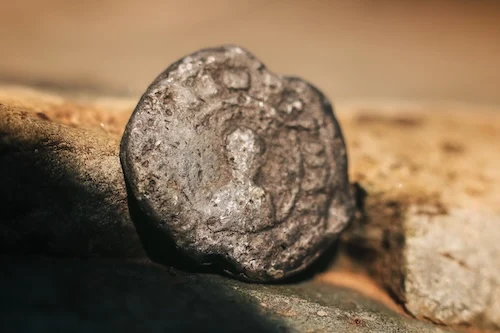
Scheduled Monuments
These can be ancient ruins, burial mounds, historic earthworks, and other nationally important archaeological sites – are also strictly off-limits for detecting.
Using a metal detector on a Scheduled Monument, or removing any object from one, without official written consent from the relevant heritage body (Historic England, Cadw in Wales, Historic Environment Scotland, or the Department for Communities in Northern Ireland) is a criminal offence and can lead to severe penalties.
Some Ministry of Defence (MOD) land will also be out of bounds for security and safety reasons.
Always, always check before you go! You can use excellent online resources to help you identify these protected areas.
In England, the MAGIC map (magic.defra.gov.uk) is invaluable for showing SSSIs, Scheduled Monuments, and other environmental designations. You can zoom into your chosen beach area and use the identify tool to see if any protections apply.
In Scotland, PastMap (pastmap.org.uk) serves a similar purpose, allowing you to check for scheduled sites and other heritage locations.
Equivalent services and resources are available for Wales and Northern Ireland, often through their respective government heritage and environment agency websites.
By being aware of these restricted zones and understanding the conservation and heritage preservation reasons behind them, you not only stay on the right side of the law but also act as a responsible custodian.
This respect for protected areas enhances the reputation of the metal detecting community as a whole.
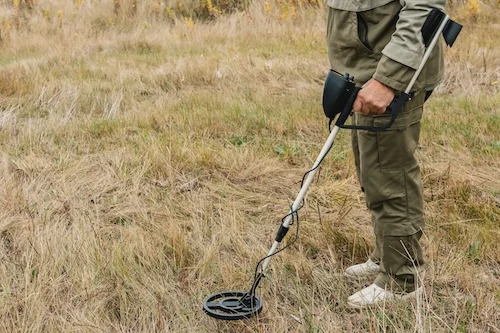
What Are the Rules if I Find Treasure or Historical Items While Metal Detecting on a UK Beach?
This is where things get really exciting, but also where you have very important legal responsibilities!
Finding a piece of history is an incredible thrill, but what you do next is vital, both for you and for our shared heritage.
The rules differ significantly depending on where in the UK the beach is.
In England, Wales, or Northern Ireland:
If you find something you believe might be “Treasure,” you are legally required to report it under the Treasure Act 1996.

So, what counts as Treasure?
Generally, it includes any metallic object (other than a coin) that is at least 300 years old and has at least 10% gold or silver content by weight.
Any group of two or more metallic objects of any composition that are of prehistoric date (before AD 1723) and found in the same place.
Two or more coins from the same find that are at least 300 years old. If the coins contain less than 10% gold or silver, there must be at least ten of them to qualify.
Objects found in the same place as, or previously together with, another object that is already deemed Treasure.
A significant update to the Treasure Act, which came into force from July 2023, expanded the definition. Now, items over 200 years old which are not coins but contain metal, and are considered to provide “an exceptional insight into an aspect of national or regional history, archaeology or culture” due to their rarity, location, or connection to a significant event or person, can also be designated as Treasure, even if they don’t meet the precious metal criteria.
You must report potential Treasure to the local Coroner for the district where you found it within 14 days of making the discovery, or within 14 days of realising it might be Treasure.
Your local Finds Liaison Officer (FLO), who is part of the Portable Antiquities Scheme (PAS), can be a huge help with this process. FLOs can also record any non-Treasure archaeological finds you make.
Recording all historical finds, even if they don’t qualify as Treasure, is strongly encouraged because every find adds a small piece to the vast jigsaw puzzle of our past.
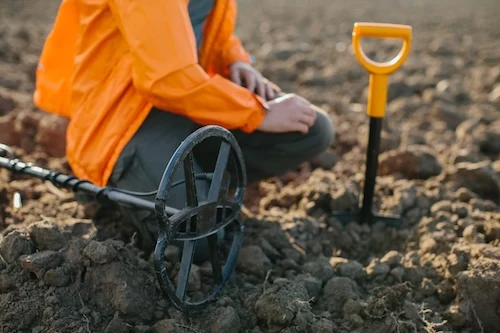
However Rules Change For Scotland
The system is quite different; it’s called Treasure Trove. Under Scots law, all portable antiquities of archaeological, historical, or cultural significance found in Scotland must be reported to the Treasure Trove Unit (TTU), which is based at National Museums Scotland.
This is a much broader definition than in the rest of the UK and applies to virtually anything old and interesting that you might dig up, not just items made of precious metals.
You should report your finds promptly to the TTU, carefully recording the findspot (a grid reference is best) and bagging finds individually.
Whether you’re in England, Wales, Northern Ireland, or Scotland, failing to report Treasure or follow Treasure Trove rules is a serious matter.
It can lead to prosecution, significant fines, and you would almost certainly lose any claim to a reward if the item is acquired by a museum.
It’s clear there isn’t one single “UK rule” for finds; the Treasure Act and Scottish Treasure Trove are distinct systems reflecting historical and legal differences.
So, it’s vital you know which rules apply to the specific part of the UK where you’re detecting. These reporting mechanisms aren’t just bureaucratic hurdles; they are essential pathways.
They ensure that significant discoveries can be properly recorded, studied by experts, conserved, and potentially acquired by museums for everyone to learn from and enjoy.
When you report your finds, you’re not just following the metal detecting laws; you’re making a direct contribution to our understanding and appreciation of history.
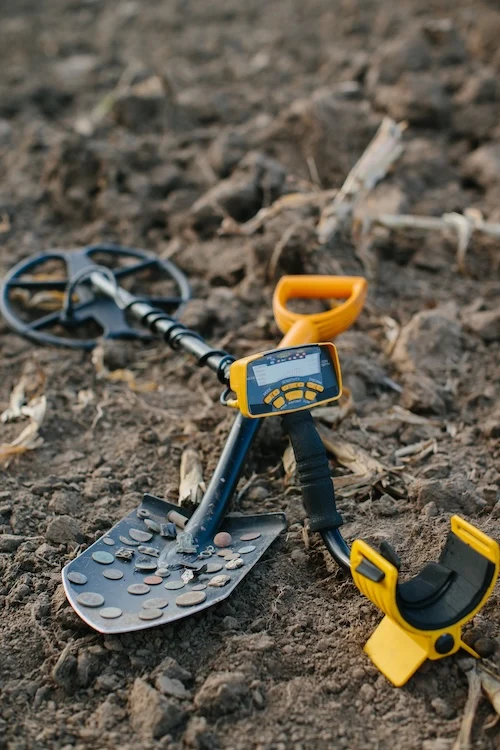
Can I Metal Detect Above the High Tide Line on UK Beaches?
This is a really important distinction you need to grasp, as the rules for metal detecting can change significantly once you step off the main part of the beach that is regularly washed by the tides.
Many metal detectorists find the area just above the high tide mark can be very productive, as this is often where beachgoers relax and might lose items like coins or jewellery.
However, this zone comes with its own set of considerations.
As we’ve discussed, the foreshore – defined as the area between the mean high water mark and the mean low water mark – often falls under the jurisdiction of The Crown Estate (or Crown Estate Scotland).
On their managed foreshore, detecting is generally allowed without a specific permit, subject to their conditions like surface searching with hand tools.
However, the land above the mean high tide line is a different story. This includes the dry sand areas where people typically lay their towels, as well as sand dunes, shingle banks, or any vegetated areas that back onto the beach.
This upper part of the beach is very often privately owned or controlled by the local council.
This means the more relaxed permissions that might apply to the Crown Estate foreshore usually do not extend to these areas.
If the land above the high tide line is private property, you absolutely need the express permission of the landowner before you can detect there. Without it, you would be trespassing.
If it’s council land, you’ll need to check their specific byelaws or policies. Some councils may have different rules for these upper beach areas compared to any foreshore they might also manage, or they might prohibit detecting altogether in these zones.
The mean high tide line is an often invisible, and sometimes shifting, boundary on the ground.
Yet, legally, it represents a significant shift in terms of land ownership and, consequently, the access rights and permissions required for metal detecting.
A beginner could easily wander from the “permitted” foreshore onto the “permission-required” upper beach without even realizing they’ve crossed this important legal threshold.
Therefore, before you decide to detect above the high tide line, you must do your homework. You need to determine who owns or manages that specific patch of land and obtain any necessary permissions.
Ignoring this boundary is one of the most common ways detectorists can unintentionally find themselves in the wrong.
Being aware of this distinction is key to managing your detecting activities responsibly and avoiding potential issues.
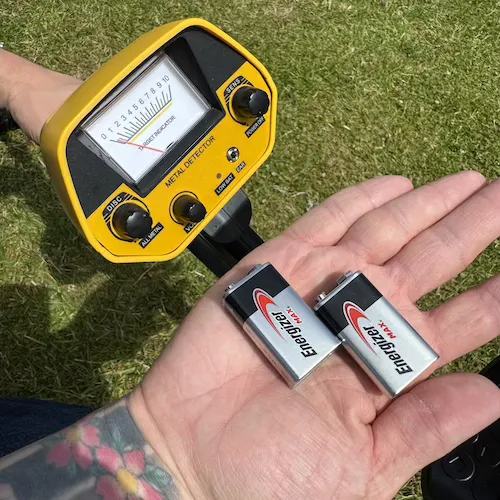
Happy (and Legal) Beach Metal Detecting!
Phew, that was a lot of information, but hopefully, you’re now feeling much more confident and prepared to head to the UK’s beautiful beaches with your metal detector!
The world of metal detecting is fascinating, offering a unique connection to the past and a wonderful way to enjoy the great outdoors.
By arming yourself with this knowledge, you’re not just avoiding potential pitfalls; you’re empowering yourself to enjoy your new hobby to the fullest, with peace of mind. Metal detecting on the beach, when done correctly and respectfully, is a fantastic pursuit.
By respecting the rules, the land, and our shared heritage, you’ll not only have a great time but also play your part in ensuring this wonderful hobby can be enjoyed by many more for generations to come.
So, check those tide times, get your permissions sorted if they’re needed, and happy (and legal) hunting
Author Profile

Piotr Lesniewski
"Digging up the past, one signal at a time."
Polish-born, Scotland-based, and obsessed with the beep. My passion began decades ago, exploring fields with my Dziadek (grandfather). Now, with over 10 years of digging under my belt, I'm here to share everything I've learned—unfiltered and unbiased—to help you unearth your own piece of history. No sales pitches, just real field experience.